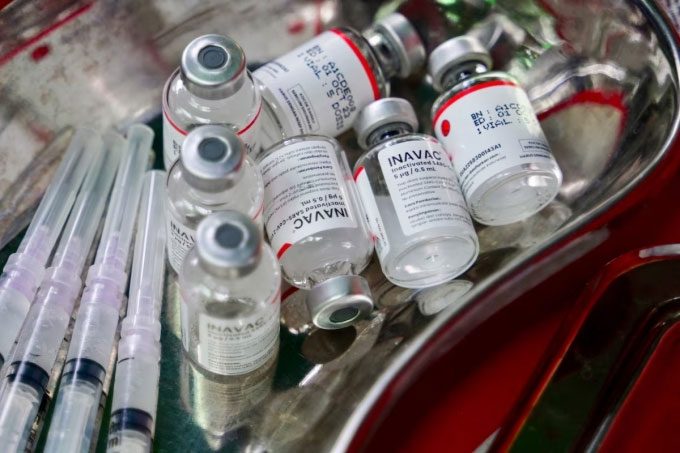JN.1 is a direct branch of BA.2.86, also known as “Pirola.” Due to mutations in the spike protein, it can evade immunity and spread rapidly.
Since December 2023, JN.1 has quickly surpassed various other versions of the virus, becoming the most dominant global variant.
What is JN.1?
JN.1 was first reported in August 2023, and it has since spread to at least 43 countries, according to the World Health Organization (WHO). On December 18, WHO classified it as a “variant of interest,” noting its rapid global spread. Similar to other dominant strains from last year, JN.1 belongs to the Omicron family and is the next generation of BA.2.86.
William Schaffner, a professor of infectious disease at Vanderbilt University Medical Center, stated that despite being in the same branch, JN.1 possesses its own unique characteristics. BA.2.86 has 30 mutations compared to the previous strain XBB.1.5, which dominated most of 2023. This strain is also a primary target for updated vaccines.
“When BA.2.86 emerged, there was widespread concern due to its numerous mutations that could evade vaccine-induced immunity. However, it failed to trigger a new wave of infections,” said Andrew Pekosz, a professor of immunology at Johns Hopkins Bloomberg School of Public Health.
However, JN.1 has additional mutations in the spike protein. According to the Centers for Disease Control and Prevention (CDC), these proteins help the virus attach to human cells, potentially leading to rapid community transmission.
What are the symptoms of JN.1?
WHO has not yet commented on the severity of illness caused by JN.1 infection. Currently, scientists are divided on this issue.
A study published in the journal Cell in early January indicated that JN.1 could infect cells in the lower lung regions, potentially worsening symptoms. Experts suggest that JN.1 effectively attaches to cells and participates in the host’s cell membrane synthesis response.
Nevertheless, some scientists argue that JN.1 is not significantly different from previous virus strains. Dr. Eduardo Aziz-Baumgartner from the CDC stated that it does not cause more severe symptoms. Patients typically experience similar issues to earlier phases of the pandemic, including sore throat, nasal congestion, runny nose, cough, headache, muscle pain, fever or chills, loss of taste or smell, nausea or vomiting, and diarrhea.
According to the CDC, the type of symptoms and severity of illness often depend more on the individual’s pre-existing health conditions and baseline immunity rather than the virus itself.

Covid-19 vaccine at a healthcare center in Jakarta, Indonesia. (Photo: AFP).
Is JN.1 more transmissible?
According to Professor Schaffner, one common characteristic of Omicron variants is their ease of transmission. Later versions of the virus tend to have better transmissibility than earlier ones. The CDC notes that the continuous development of JN.1 indicates that it may have higher transmissibility, better replication rates, or more effective immune evasion.
Experts caution that it is still too early to determine the precise transmissibility or immune evasion characteristics of JN.1. However, it has already sparked a wave of Covid-19 cases in several countries.
Can standard tests detect JN.1?
According to the CDC, all Covid-19 diagnostic tests, including rapid tests and PCR, are effective against JN.1, as well as other variants. Schaffner emphasized that testing is a critical tool for protecting oneself and others from Covid-19.
Experts point out that the symptoms of Covid-19 are often hard to distinguish from other respiratory viruses that spread in cold weather, such as RSV, influenza, and rhinovirus. They urge individuals exhibiting symptoms like fever, cough, or sore throat to limit contact with others to prevent further spread, especially to more vulnerable groups.
Are vaccines still effective against JN.1?
The CDC indicates that newly updated Covid-19 vaccines can enhance protection against JN.1, as well as other variants. Previously, some experts had noted that vaccines based on the XBB.1.5 variant were less effective against HV.1, JN.1, and EG.5. However, scientific evidence shows they still protect users against severe illness and death.
Data from laboratory studies indicate that vaccines elicit a strong immune response against JN.1’s “relative,” BA.2.86.
How to protect yourself from JN.1
To protect yourself against Covid-19 and other respiratory viruses in cold weather, experts recommend getting fully vaccinated, closely monitoring your symptoms, isolating if infected with Covid-19, avoiding contact with sick individuals, ensuring good ventilation in living spaces, wearing masks in public, and frequently washing hands with soap.


















































